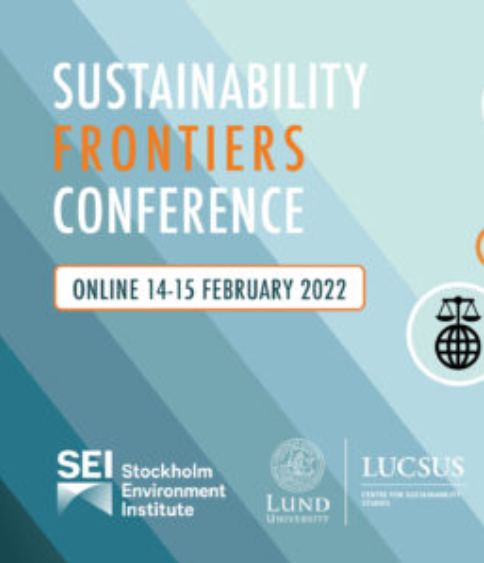Fielding decided on a unique form for the panellist discussion. He asked William Clark to propose the top three priorities for Sustainability scientists over the next five years. The next speaker, Persson, would then be given the opportunity to reject, amend, or adapt the list before passing to the next speaker and so on. The intention was to end with a set of three aims that are largely agreed upon by all speakers.
Clark began by positing that he answers with his sustainability scientist hat on, not as a citizen-activist. Were he to respond as the latter he might have a different list. His list and justification is given below:
Focus more on the long-term, particularly on intergenerational timescales of development.
Clark suggested that scientists are not trying to explain tomorrow morning’s inequity, despite the importance, but also over the long term co-evolutions of society in time. There are too few datasets of how nature-society co-evolve over time (though he shared some links, copied below at the bottom of this blog post): what is needed is long term data sets that gives a deeper indication of what actually consists of the problems we are trying to solve.
Goal articulation, measurement and reporting back processes.
This issue concerns what the collective-we want to work for. Is this about the wellbeing of people, or planet? How would you measure that? What could the IPCC use in their assessments? In the Sustainable Development Goals there are 200 variables, which allows people to cherry-pick during their reporting.
Transitions research
The third has a significant body of literature, however it needs to be contextualised. Furthermore, the transferability of these transitions need to be explored and agreed upon. More thinking should be put towards the conditions that advance transitions as well as how they can be co-opted by incumbent interests.
Persson accepted all three of Clark’s priorities for sustainability science but advanced them slightly. She suggested that each of these needed to be agent and actor aware, and included processes of leadership. The million dollar question for her was about acceleration in the transition. Certainly there must be legitimacy and robustness, but also speed. Finally she added the idea of accountability and evaluation to the second of Clark’s list. Scientists should both sanction and celebrate good performance in environmental governance, but this requires data.
Boyd followed Persson, by agreeing with Clark’s point on transitions. Here she would add “Just” before “Transitions”, and more work done on investigating what constitutes just transition. Secondly, on the point of measuring and metrics: she agreed, but came from a different angle. Her angle concerned the development of trandsciplinary learning processes, which could broaden the tools available in problem-based learning. This would mean broadening measurements. She came to the idea of accountability then and raised power. “Sure,” she said, “we have done power to death, but there are still questions to be asked.” There is a tension between top-down and bottom up perspectives that needed to be navigated.
Joshi had the final say in this exercise, agreeing also with much of the list. In addition to the long-term lens, Joshi brought in the work of Bagele from the decolonial session: How much of Western thought is dominated by the individual? How could that be benefitted by other concepts of existance within the collective. Second, she came to goal articulation and acceleration, reposing the question of measurement and metrics for progress. Finally, on just transitions: the how is missing. How are these roadmaps or pathways contributing towards realising the lofty targets of just transition.
The moderator summarised the results of the exercise as five agreed upon priorities for sustainability science over the next 5 years:
- Focus on the long term, i.e. intergenerational.
- Develop and implement better tools and metrics (inc. monitoring accountability to declarations/commitments). How to evaluate progress? Measure the “how”.
- Focus on the fundamental just transitions to sustainability (inc. e.g. Biodiversity).
- Awareness of actors, working in collaborations.
- Power dynamics – positionalities and tensions between individual/collective.
For earlier posts about this conference click here.
Clark’s references:
Long term:
- Lintsen, H. et al. (2018). Well-being, Sustainability and Social Development: The Netherlands 1850-2050. Springer International Publishing. https://doi.org/10.1007/978-3-319-76696-6
- Tellman, B. et al. (2018). Adaptive pathways and coupled infrastructure: Seven centuries of adaptation to water risk and the production of vulnerability in Mexico City. Ecology and Society, 23(1), art1. https://doi.org/10.5751/ES-09712-230101
Measurement:
- Laurent, É. (2018). Measuring Tomorrow: Accounting for Well-Being, Resilience, and Sustainability in the Twenty-First Century. Princeton University Press.
Transitions:
- Geels, F. W. (2019). Socio-technical transitions to sustainability: A review of criticisms and elaborations of the multi-level perspective. Current Opinion in Environmental Sustainability, 39, 187–201. https://doi.org/10.1016/j.cosust.2019.06.009
A broader agenda:
- Clark, W. C., & Harley, A. G. (2020). Sustainability Science: Toward a Synthesis. Annual Review of Environment and Resources, 45(1), 331–386. https://doi.org/10.1146/annurev-environ-012420-043621 (OA)


